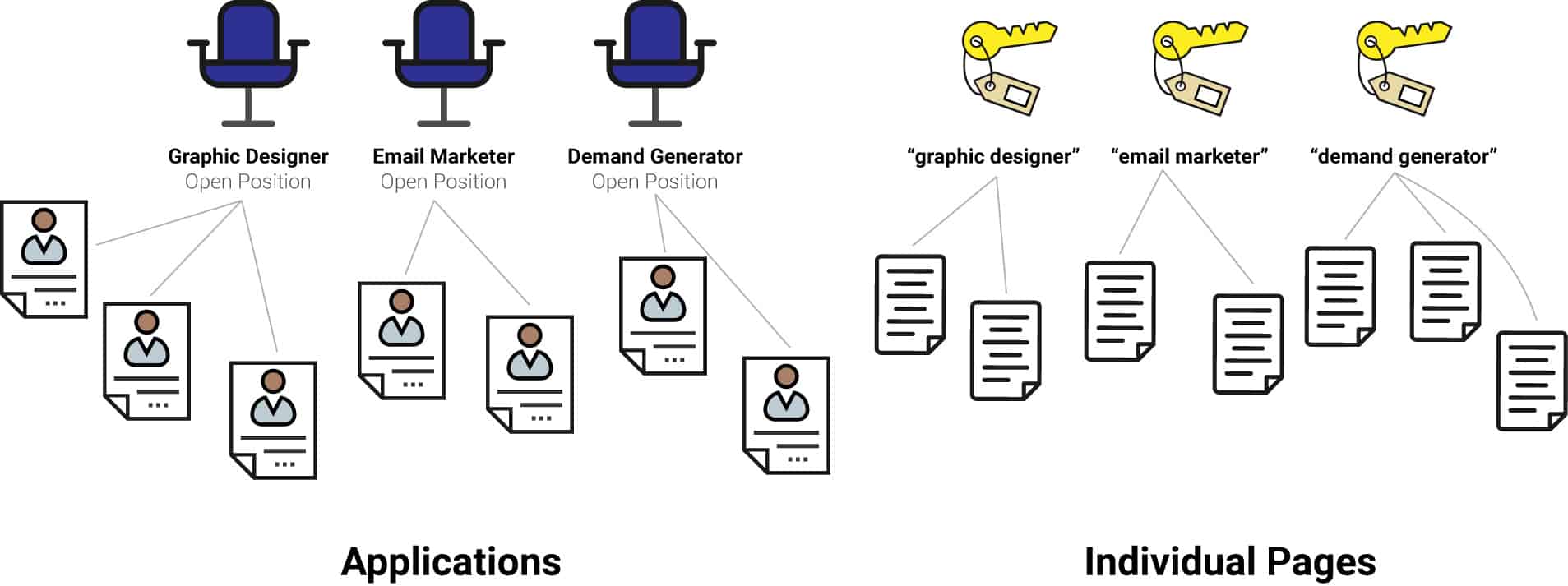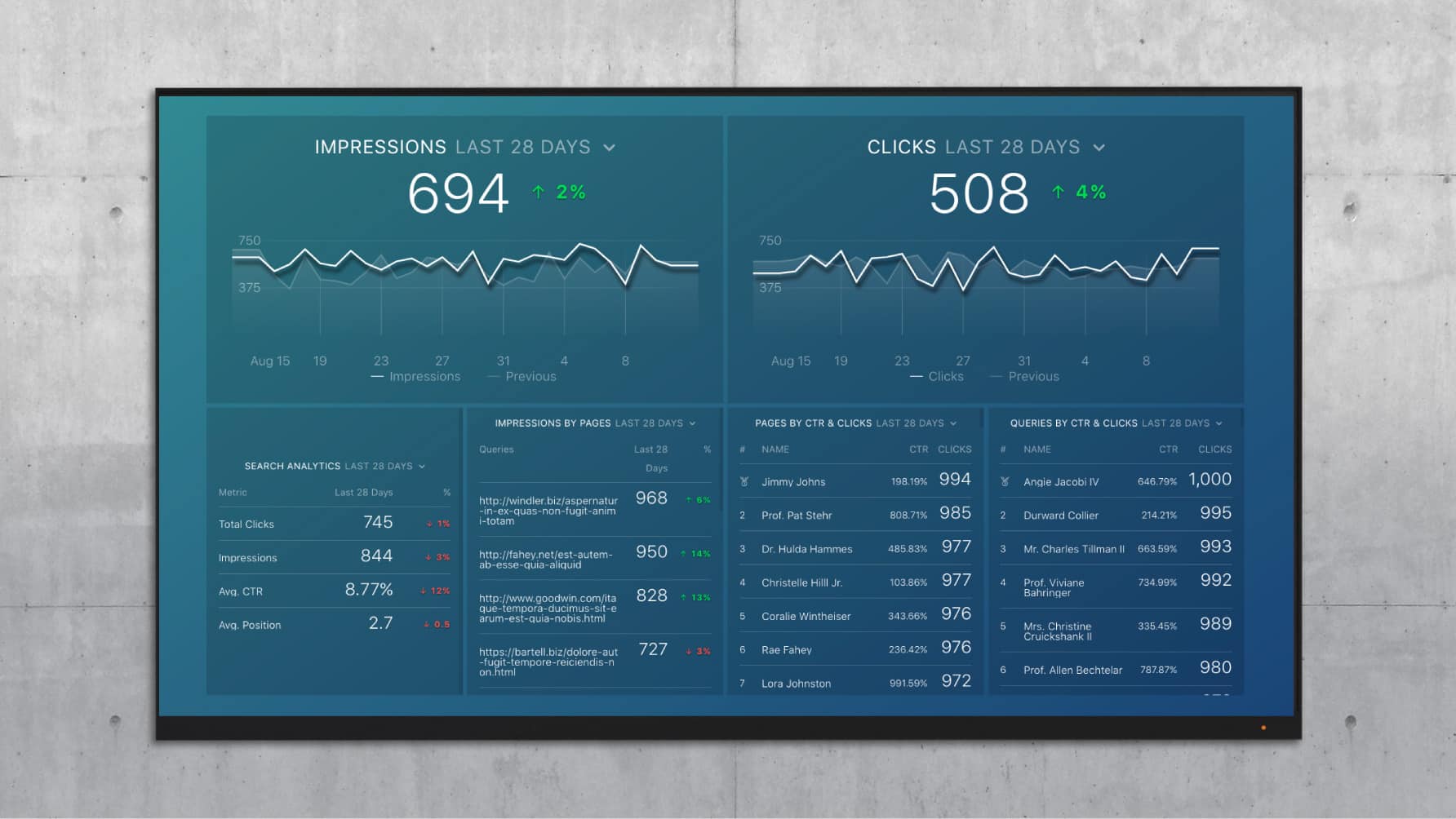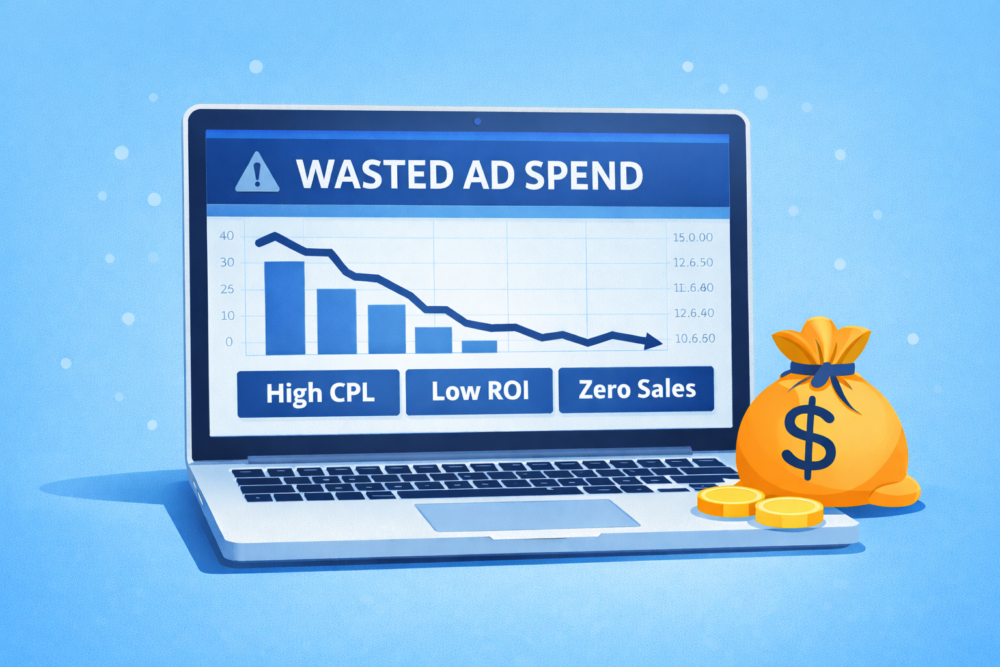Table of contents
Have you ever applied for a job? (Of course you have.) Then you can easily understand Google’s top ranking factors.
We recently asked our community of digital marketing experts about common SEO mistakes that they see.
We received over 100 responses.
One mistake came up over and over again:
Many marketers and small business owners seem to pick one SEO tactic, and ignore the rest.
For example, if a website owner wants to increase their organic traffic, and he/she believes that a flood of backlinks will have a big impact on their site traffic, well, you know what comes next.
The site owner acquires hundreds of spammy and low-quality links and waits for the results to roll in.
They never do. In fact, their domain might get penalized.
Or, if keywords seem to be the SEO tactic du jour, he/she will cram the target keyword into as many paragraphs and headings as possible.
It’s 2018. That’s not going to cut it. Google is smarter than that.
One of the reasons that marketers make this mistake is that there are over 200 ranking factors that Google uses, and it is impossible to keep track of all of them.
Google also updates its algorithm every couple of years, so 5-year-old SEO knowledge is not very useful.
I dug into the top ranking factors in 2018, and realized that Google’s algorithm operates like a manager that is looking for new employees. So if you have ever applied for a job (and gotten an offer), then you will be able to understand Google’s top ranking factors.

Google’s Top Ranking Factors
I used SEMrush’s exhaustive Ranking Factors study, which includes data from over 600,000 keywords.
Google does not publicly disclose its exact algorithm, of course, as this would only allow people to further game the system.
Here is an overview of SEMRush’s findings:

The General Concept Behind Ranking For A Keyword
Here’s the scenario we will be using for the rest of this post: You have a background in marketing, and your application is being considered by the Marketing Director at Normal Corp.
The director manages 50 employees and has openings for multiple positions at any given time.
Each of these open positions is like an individual keyword. The manager has to review applications for each individual position and decide who to hire.
Similarly, Google has an unlimited number of keywords, and it must decide which pages will rank for each one.

The applications that the hiring manager must consider are like individual pages on a website.
Just like an individual job posting might get hundreds or thousands of applications, Google’s algorithm must rank thousands of pages for each individual keyword.

Finally, the job applicant (that’s you) is similar to a domain, like databox.com, which contains many pages. When most people apply for a job, they send out many applications for multiple positions at different companies. A domain has many pages, each of which can rank for their own keywords.
But, Google also looks at the authority of the domain as a whole, much like a manager does not just look at a person’s resume, but also their full employment history and overall personality.

So let’s jump into each individual factor to see how Google evaluates your content.
Important Ranking Factor #1: Quality Content
3 out of the top 4 ranking factors in SEMrush’s study were related to on-page engagement.

Time on site, pages per session, and bounce rate are three popular metrics in Google Analytics that measure whether visitors actually enjoy their experience on a site.
They prove that visitors are reading and enjoying the content on the site, and they might even click on internal links to learn more.
Note: if you want to learn more about these quality metrics in Google Analytics, check out our separate guide to Google Analytics basics.
Imagine if you were sitting in your interview for the marketing position, and the director asked you, “Can you tell me a little bit about your role at your previous company?”
And you responded:
“I used data to make major decisions that impacted the company’s bottom line. I ran our key 2017 initiative and delivered the project on-time and within budget.”
That is, frankly, a bunch of buzzwords strung together into two sentences.
It does not give the director any actual idea about what you did, and how you might benefit his/her company.
Now, the director is going to need to rephrase the question and ask again, and hope that you offer a better response.
Instead, a great response would encourage a series of follow-up questions from the director. It would give him/her some immediate, useful information about your previous role.

Even if your resume says “marketing manager” on it, and even if you have a few references, the director still needs to see evidence that you can do great work.
Google looks at content quality for the same reasons. If visitors are not curious enough to read more and they leave the site without clicking on another page, then that’s a pretty good sign that they did not find anything useful.
Important Ranking Factor #2: Backlinks
The 5th through 8th most important ranking factors all related to backlinks.

Think about the references that you usually offer with your job application. What if one of your references was your bartender?
What if your second listed reference was your brother?
Obviously, this would be absurd and offer no value to the director.
Yet, when marketers try to quickly boost their organic traffic, they will pay shady third party sites for backlinks.
Just like the director would doubt your qualification if you offered irrelevant references, Google will penalize your domain for irrelevant backlinks.

Instead, Google wants to see links from other high-quality domains in your niche, just like a director wants to see references from respected leaders in the marketing industry.
All backlinks are NOT equal. As you can see in the chart at the top of this section, Google looks at both total backlinks and total linking domains. Google will reward you for more high-quality references.
Important Ranking Factor #3: HTTPS
The 10th-most important factor in SEMrush’s study was HTTPS, or an SSL certificate for the domain.

This one is pretty straightforward. It’s kind of like a company policy that requires background checks on every potential employee.
Yes, if the company skipped that step, they would still make a safe decision 95% of the time, but it’s the other 5% of the time that you worry about.
Sites that do not own an SSL certificate but also earn good backlinks are usually safe, until you run into one that isn’t.
Google recently added this ranking factor to increase safety for its users.

Important Ranking Factor #4: Keywords
And finally, we arrive at keywords, which were the 11th through 16th most important ranking factors in the study.

Using keywords is probably the most popular SEO tactic. Keywords in headers, body paragraphs, page titles, and everywhere else.
Although it is on the list of top factors, it is not nearly as important as content and backlinks. Here’s why.
Let’s imagine that you make sure to use all the popular marketing buzzwords to describe your past marketing experience.
“Marketing manager”… “growth hacker”… “SEO ninja”… you name it.
But, almost any other applicant could use those terms to describe themselves. All they need to do is type it into their application. There is no barrier to entry.
There is one more issue with the keyword-focused approach: this is not a straightforward competition.
Let’s say that you are applying for a “Digital Marketing Manager” position, and you have a background in written content.

You may be competing against other marketers with backgrounds from diverse fields. They could come from the fields of PR, demand generation, or advertising. And they still might be equally qualified–that is why the director needs to hold an interview.
Keywords are not a great way to determine if you are qualified or not.
Google looks at individual pages in the same way. Anyone can load up their H1, title tags, and paragraphs with keywords with little effort.
Google will take these signs into consideration, but they matter far less than the quality of content.
The Top Ranking Factor: Direct Traffic
So far we have danced around the number one factor from SEMrush’s study: direct traffic.
In other words, traffic derived from typing a brand’s name directly into the Google search bar.
I chose to mention this one last because it is rarely discussed in other studies about ranking factors.

When you have applied for a job in the past, have you ever received an internal referral from an employee of that company?
That means that an employee approached the director and said, “I think it would be great if we hired this candidate.” Or, someone from the director’s network personally recommends you for the job.
If you have, you know that this is the best way to stand out from all the other candidates.
Many of these other candidates likely have great applications and qualification for the position, but an endorsement from the right person will set you apart. And, if you can get an endorsement from multiple people in the right places, you will look even better.

Google respects direct traffic for the same reason. If searchers are specifically seeking out a brand, there is clear evidence that the brand is more desirable than other brands that are not being requested as often.
This is a more straightforward indication than backlinks or content quality.
Direct traffic is often fueled by spreading your brand.
Many marketers are unsure how to measure the success of branding efforts, but this is one clear opportunity to achieve an ROI.
When more prospects are curious about your company’s brand, their Google searches will yield direct traffic and greater exposure for your content via increased organic traffic.
Editor’s note: This one has received some criticism from the SEO community, since direct traffic is not traditionally regarded as a ranking factor. Many SEOs feel that this is an issue of correlation v. causation. In other words, a great brand ALSO has a great domain, and it will appear that direct traffic led to its strong domain authority. In reality, a great brand leads to more backlinks and time on site, which is what causes the jump in rankings.
Let’s use an example. Let’s say you own coolrollerblades.com, an e-commerce store for vintage rollerblades. You dominate the rollerblade niche. Many rollerblade enthusiasts are already familiar with your brand when they look to buy a new pair. So, they are more willing to link to your domain. And, when they arrive on your site, they spend more time browsing your store compared to unknown rollerblade e-commerce stores. This is one way that direct traffic may lead to a higher domain authority.
To return to our analogy, if you apply to a new job and receive an excellent internal referral, you will still need to back up that referral with a strong interview and glowing references. If you have crappy references, the director is going to wonder how you received the internal referral!
Much Like Hiring, SEO Is Not About One Factor
One reason that marketers try to simplify SEO into one tactic is that SEO is really complicated.
Rather than spend hours on a learning binge that still may leave confusion, they choose to reduce the number of steps and begin executing their own SEO strategy.
Imagine if job applicants used these questionable SEO tactics.
They would spend hours on sourcing references from college classmates, family members, people on the street, and more. It would be an absurd exercise.
Google’s algorithm has not always been quite so intelligent.
In the past, short content stuffed with keywords actually had a shot at ranking.
But, as content marketing became more popular, Google adjusted its algorithm to make sure the best content reached the top.
It’s kind of like what happens after a job posting receives many applications–the hiring manager can be pickier.
If you are interested in learning about a couple of ways to create a holistic SEO strategy, check out our guide to beginner’s SEO techniques. Or, if you want to start tracking all your SEO metrics in real-time, check out our pre-made Google Search Console dashboard.














